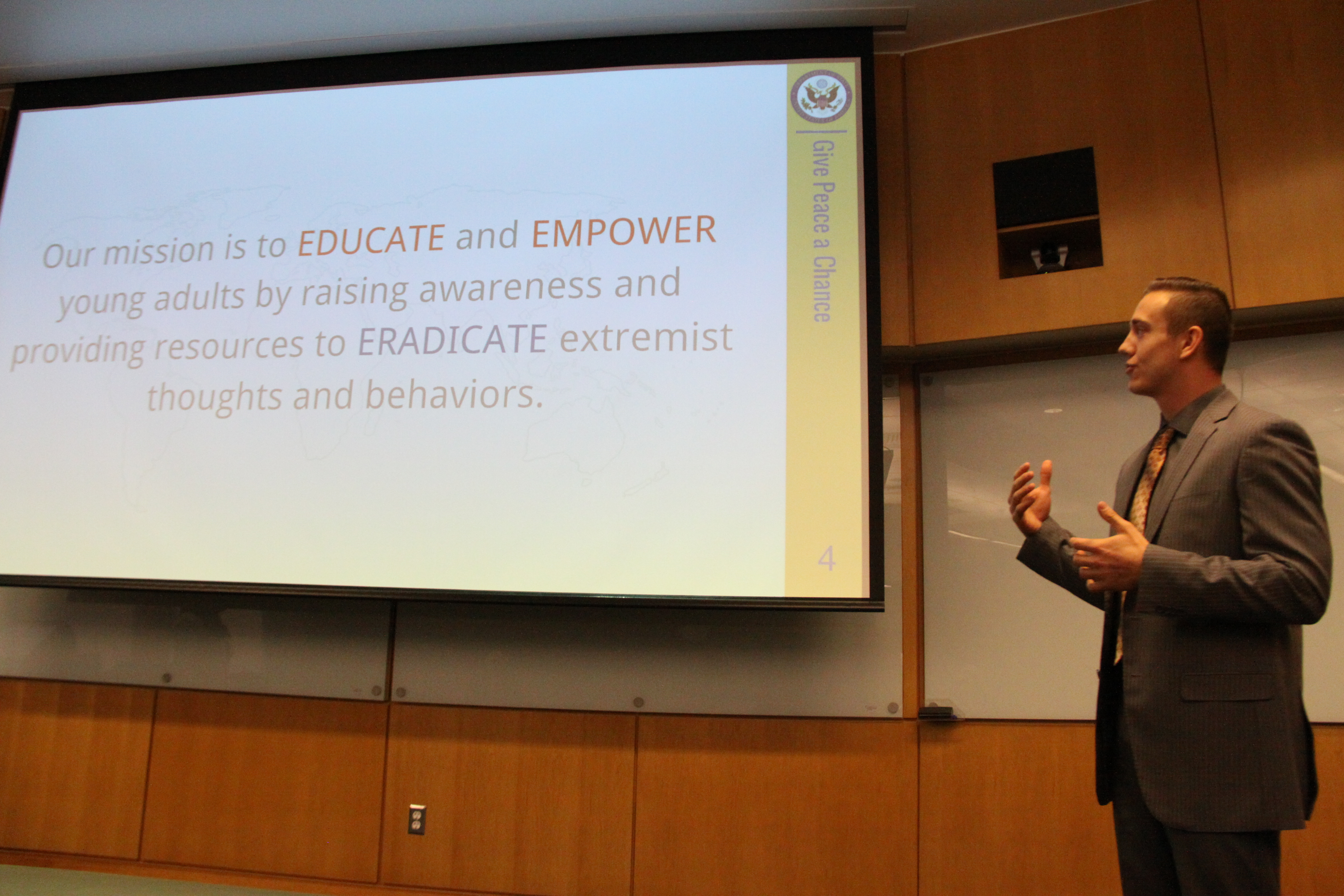
University of New Hampshire senior Nick Hutchinson, 21, presents his group's capstone project. (Kirk Carapezza/WGBH)
Marketing majors at the University of New Hampshire are used to making pitches and presentations. But the project they just completed is unlike any other they've been assigned in the past.
As part of their marketing capstone course, a group of students was tasked with crafting a campaign to address violent extremism.
Their client? The federal government.
“I remember the first time we were presented with it I was just so overwhelmed,” said senior Kelly McIntyre, one of the group’s twelve members. “I was like, ‘This just sounds like a project that’s so much bigger than us; how could we even make the smallest impact with such a huge topic that everyone’s talking about and seeing on the news?’”
UNH is among dozens of schools that received funding to develop anti-radicalization campaigns. The U.S. State Department, in partnership with Facebook, awarded the $2,000 grants to 45 colleges and universities globally.
For their campaign, UNH students chose to target high-schoolers.
“We believe they’re the most impressionable and they’re kind of becoming themselves and coming up with their own beliefs,” said McIntyre.
The first step to countering extremism – the group argues – is getting students to talk about it in school.
“Schools are where students go every single day, and schools are where these students have their mentors and have these adults who are very influential and really make a difference in their lives,” said McIntyre.
To get the conversation started, they designed educational materials on extremism for teachers and school officials. But encouraging student-teacher discussions on the topic is not enough.
After polling hundreds of high school students, the group discovered that the vast majority of those students – over 90 percent – did not have conversations about extremism with their parents. To ensure the topic made it beyond school grounds, the group also created materials for parents. Their hope is that conversation about radicalization will be approached similarly to conversations about sex, drugs or alcohol.
The project also has a strong presence on social media outlets, the same spaces where ISIS militants have recruited thousands of Western allies.
“The whole idea is posting our current events and information on there so students are learning about current events and what’s going on in the world around them but from a valid source,” said McIntyre.
Since the digital landscape is constantly shifting, tech savvy college students are well positioned to reach lonely young people who might be susceptible to radicalization.
“Who better to create these YouTube videos, these mobile apps, these hashtag initiatives, these really engaging social impact campaigns in communities than young people?” said Tony Sgro, founder of EdVentures, the private company that matched the 45 participating colleges and universities with the State Department.
Sgro says the federal government needs extra help from the private sector, universities, faith-based groups, non-governmental organizations and others to counter radicalization.
“This problem is much more than just what the government can do,” said Sgro.
On Friday, the State Department and Facebook chose six finalists to go to Washington to present their campaigns to federal officials. But Sgro says that doesn’t mean it’s game over for the 39 groups that didn’t make the cut.
“One of the important hopes of this initiative is that [it] serves almost as a Silicon Valley incubator where some of these ideas - if invested in from NGOs and philanthropists and governments from around the world and foundations – can live in perpetuity,” said Sgro.
Even though their project did not make it to the next round, students at UNH say the group will move forward with their campaign.
“I think it’s still such an important, relevant thing that we should be implementing it into New Hampshire schools even Massachusetts schools just locally and maybe see where it can go from there,” said McIntyre.










